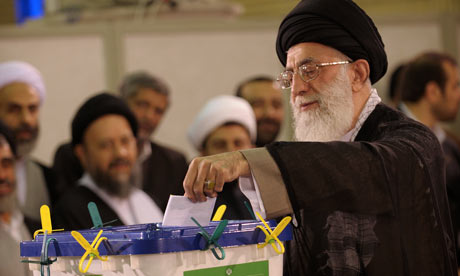 A day before Iranians vote in Parliamentary elections, who's winning?
A day before Iranians vote in Parliamentary elections, who's winning?
We do not know. And we will not know for some time to come. The messy truth beyond the easy narrative of Supreme Leader v. President Ahmadinejad is that the lists of candidates do not work that way, and the vote itself will not yield a "dominant" faction.
Let's start with basics from an EA correspondent in Iran
There are three main lists in Tehran: Jebhe-ye Paydari (Ahmadinejad --- Islamic Constancy/Resistance Front); Jebhe-ye Mojtahed (Mahdavi Kani --- Unity Front) and Seda-ye Mellat (Motahari --- The Voice of the Nation). Many other lists... are insignificant, but they embrace famous candidates to head a list of unknown (and chanceless) candidates. And not necessarily with the prominent candidates’ approval, why is why several of the figures on Tohid va Edalat [Monotheism and Justice Front] quickly denounced their affiliation with the list.
We have portrayed the Unity Front as the "traditional" conservative and principlist faction, headed by Ayatollah Mahdavi Kavi, the leader of the Assembly of Experts, and including representatives of the Supreme Leader and of prominent politicians such as Speaker of Parliament Ali Larijani and Tehran Mayor Mohammad-Baqer Qalibaf. The Islamic Constancy/Resistance Front (we have used the terms interchangeably) is headed by Ayatollah Mesbah Yazdi and is generally seen as sympathetic to the President. The Voice of the Nation, including MP Ali Motahari, consists mainly of "breakway" principlists who are hostile to Ahmadinejad and who have been excluded from the candidates' list of the Unity Front --- it may attract the support of those reformists who do not boycott the election.
To these, we can add the lesser-known collections of candidates who might still have some impact, such as the Steadfastness Front, including 2009 Presidential contender Mohsen Rezaei, and the curious Monotheism and Justice Front, which suddenly sprang up as an apparent supporter of Ahmadinejad and his Chief of Staff Esfandiar Rahim-Mashai but has collapsed in confusion over who actually wants to be tied to it.
The problem with this opening description is that candidates can belong to more than one list. A prominent politician named Morteza Agha Tehrani is on the slate of both the Unity Front and its supposed rival, the Constancy/Resistance Front. So is former Speaker of Parliament Gholam Ali Haddad Adel. And Motahari, in his challenge to Ahmadinejad and the Government, is on at least four lists.
Add to this that voters do not choose a list, say like ticking "Democratic" or "Republican" Party in the US; they put in individuals. In Tehran, for example, a voter writes out 30 names.
Yhe easy path --- if there is an easy path in this system --- is to say Supreme Leader v. Ahmadinejad, pick out some names on Saturday after the first round of voting, and then declare, "He wins. The other one loses". But anyone who takes that road is likely to be offering no more than a fluttery headline, removed from the complexity of the politics.
We may know, in the statements after both rounds of the ballot, which way the political tide is flowing. The first notable marker may not come, however, until the Speaker of Parliament is chosen. If Ali Larijani retains his post, then the bloc "balancing" against Ahmadinejad remains and may move more aggressively against a President in his last year in office. If the Speaker is Haddad Adel, who has ties to the Supreme Leader's camp but who has been supportive of Ahmadinejad in recent statements, then there is likely to be an accommodation with the President's men.
There is also the "rogue" element of Motahari, who has dared not only to pursue Ahmadinejad's removal but also made some implicit criticisms of the Iranian system. That could gather the support of those disenchanted with the economic and political system but still motivated enough to vote. However, as our correspondent in cautions, Motahhari may end up as one the big winners in Tehran (maybe even top 5), but his limited power base will not be able to sustain him and he won’t be a serious candidate for the Presidency, as some predicted."
All that is weeks away. In the meantime, there is another, far different measure of "winner" and "loser". All the factions except possibly Motahari's breakaway group --- Unity, Constancy/Resistance, Steadfastness --- and, more importantly, the Supreme Leader have put their chips on a high turnout in the vote. If that does not materialise, then all will suffer a blow to legitimacy.
Ayatollah Khamenei, putting in more chips on Wednesday, said Iranians will give a "harsh slap in the face of imperialism" when they turn out tomorrow. But the converse is also true: if they do not think it is worthwhile to go to the polls, then a lot of faces within the regime will feel the sting.